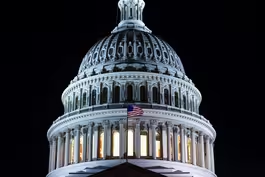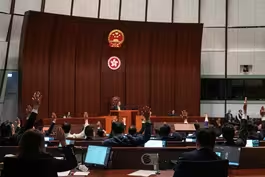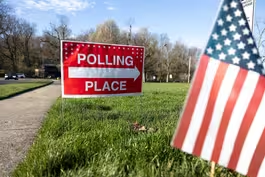
EPA aims to accelerate EV transition with emissions rules
Clip: 3/20/2024 | 5m 10sVideo has Closed Captions
EPA aims to accelerate transition to electric vehicles with updated emissions rules
The Biden administration has finalized what are the toughest standards for vehicle emissions that limit the amount of greenhouse gasses allowed from tailpipes. The new rules are designed to accelerate the transition to electric vehicles, but it hasn't come without some pushback. Geoff Bennett discussed more with David Shepardson of Reuters.
Problems playing video? | Closed Captioning Feedback
Problems playing video? | Closed Captioning Feedback
Major corporate funding for the PBS News Hour is provided by BDO, BNSF, Consumer Cellular, American Cruise Lines, and Raymond James. Funding for the PBS NewsHour Weekend is provided by...

EPA aims to accelerate EV transition with emissions rules
Clip: 3/20/2024 | 5m 10sVideo has Closed Captions
The Biden administration has finalized what are the toughest standards for vehicle emissions that limit the amount of greenhouse gasses allowed from tailpipes. The new rules are designed to accelerate the transition to electric vehicles, but it hasn't come without some pushback. Geoff Bennett discussed more with David Shepardson of Reuters.
Problems playing video? | Closed Captioning Feedback
How to Watch PBS News Hour
PBS News Hour is available to stream on pbs.org and the free PBS App, available on iPhone, Apple TV, Android TV, Android smartphones, Amazon Fire TV, Amazon Fire Tablet, Roku, Samsung Smart TV, and Vizio.
Providing Support for PBS.org
Learn Moreabout PBS online sponsorshipGEOFF BENNETT: The Biden administration has finalized what are the toughest standards for vehicle emissions that limit the amount of greenhouse gases allowed from tailpipes.
The new rules are designed to accelerate the transition to electric vehicles, but it hasn't come without some pushback.
David Shepardson is covering all of this for Reuters, and he joins us now.
Thanks for coming in.
DAVID SHEPARDSON, Reuters: Thanks.
GEOFF BENNETT: So, the Biden administration is rolling out these new standards for passenger cars and trucks designed to push the U.S. auto market toward electric vehicles and hybrids.
What's the EPA's expectation for that transition under this new rule?
DAVID SHEPARDSON: It's pretty aggressive.
So these rules start in 2027 and go through 2032, and, by 2030, you would have at least 50 percent plug-in hybrids and full electric vehicles under the various scenarios that auto companies can use to comply.
But, as you said, they can pick from a mix of different options, hybrids, plug-ins, advanced gasoline vehicles.
And unlike the initial proposal, which had projected that there'd be 60 percent all E.V.s by 2030 and 67 percent E.V.s, those numbers are coming down because EPA is slowing the rate of increase and giving auto companies a break through 2030.
GEOFF BENNETT: Well, to your point, the fact that these rules are being rolled out more slowly, companies have more choices in terms of how they can comply, Toyota, which is the world's largest automaker, they were pretty forceful in their initial pushback.
What was their argument?
DAVID SHEPARDSON: So, their argument was that plug-in hybrids are -- can save an equivalent or more CO2 because they have smaller batteries, can be deployed across more vehicles, as opposed to larger batteries and single vehicles.
And that argument, I think, had a lot of resonance with the administration and with other advocates.
So the rule incentivizes plug-ins further by giving them additional credits, which they were not going to get originally.
So, the new rule really looks far more holistically at advanced vehicles, looking at both E.V.s and plug-ins, rather than focusing primarily, as the earlier proposal did, on E.V.s.
GEOFF BENNETT: That concession, allowing more plug-in hybrids, what does that say about the demand for pure electric vehicles?
DAVID SHEPARDSON: Well, it's not moving as fast as people had thought.
Now, certainly, it's still rising, but there have been some troubling signs.
Auto companies like Ford have cut back production of the F-150 Lightning.
We have seen other auto companies like GM delay some significant E.V.
projects.
So it is still rising.
We're at about 8 percent we were in last year.
And it's going to continue to go up, but there are concerns that that very high level of increase we have seen in the last few years is going to moderate and the companies are not going to be able to meet these very aggressive standards.
GEOFF BENNETT: What about the infrastructure for electric vehicles?
When are all of those new chargers, when is that supposed to come online?
DAVID SHEPARDSON: Right, because, remember, the administration spending $7.5 billion to get hundreds of thousands of chargers in place.
GEOFF BENNETT: Right.
DAVID SHEPARDSON: And there's really not many of them, really just a few dozen, roughly.
So I think the argument the administration is making is, we're going to see all of those by 2030 or earlier, right?
And so the battery factories will be online, a lot more vehicles will be in place, and the charging infrastructure will be much more robust.
So, in theory, the conditions are there to have a much more aggressive, robust take rate on E.V.s than we have now.
But, certainly, critics say, if you take your foot off the gas, so to speak, then you're not going to be -- that auto companies might slow that change, might be a little less willing to make the full investment toward E.V.s.
GEOFF BENNETT: Take your foot off the gas, so to speak.
DAVID SHEPARDSON: Right, exactly.
(LAUGHTER) GEOFF BENNETT: So, look, there are a lot of political battle lines being drawn around all of this.
Donald Trump has railed against electric vehicles.
The United Auto Workers union, which has endorsed President Biden, they have expressed a lot of concern about job protections and wage protections for people who build the cars and build the E.V.
batteries.
DAVID SHEPARDSON: Right.
GEOFF BENNETT: Help us understand that dynamic.
DAVID SHEPARDSON: So, President Trump certainly has been very bombastic, right?
In his administration, he sought to roll back and did roll back some of the greenhouse gas standards that were reinstated and then increased by the Biden administration.
But one of the benefits to plug-in hybrids, that both the UAW, Toyota, you mentioned, others like is that they still have internal combustion engines, so they require more workers to build those.
That's what the UAW likes, and that's why many Americans are more comfortable, because, if you run out of electricity, you can still put gasoline in that vehicle.
So, at least for the short term, there's a lot of people who like that vehicle, even though the environmental benefits are somewhat in dispute, given we don't know how much that vehicle is going to be charged versus on gasoline.
But there's no question that this issue in those key states, right, Michigan, Pennsylvania, Wisconsin, those auto states, so that the former President Trump's harangue about E.V.s, and the Biden administration's arguing, hey, this is going to ensure we're competitive with China and we're going to create more jobs on net with all these new battery factories, is going to be a key decider on what side they will come down on in the election.
GEOFF BENNETT: David Shepardson, thanks so much for your reporting and insights.
I could talk to you about this all day.
DAVID SHEPARDSON: Thanks, Geoff.
GEOFF BENNETT: All right, take care.
Agreement may not pass in time to avoid government shutdown
Video has Closed Captions
Clip: 3/20/2024 | 8m 8s | Why the government funding agreement may not pass in time to avoid a shutdown (8m 8s)
China tightens grip on Hong Kong with law punishing dissent
Video has Closed Captions
Clip: 3/20/2024 | 9m 54s | China tightens grip on Hong Kong with passage of strict law punishing dissent (9m 54s)
Miss. 'Goon Squad' case highlights abuse in rural areas
Video has Closed Captions
Clip: 3/20/2024 | 6m 34s | Mississippi 'Goon Squad' case highlights abuse in rural areas and power of sheriffs (6m 34s)
Texas immigration law on hold as appeals court hears case
Video has Closed Captions
Clip: 3/20/2024 | 5m 22s | Controversial Texas immigration law back on hold as appeals court hears arguments (5m 22s)
Trump candidate wins primary in race that may decide Senate
Video has Closed Captions
Clip: 3/20/2024 | 4m 51s | Trump-backed candidate wins Ohio GOP primary in race that could decide control of Senate (4m 51s)
Xochitl Gonzalez discusses anticipated new novel
Video has Closed Captions
Clip: 3/20/2024 | 7m 6s | Xochitl Gonzalez's new book 'Anita De Monte Laughs Last' takes on art and personal history (7m 6s)
Providing Support for PBS.org
Learn Moreabout PBS online sponsorship
- News and Public Affairs

FRONTLINE is investigative journalism that questions, explains and changes our world.

- News and Public Affairs

Amanpour and Company features conversations with leaders and decision makers.












Support for PBS provided by:
Major corporate funding for the PBS News Hour is provided by BDO, BNSF, Consumer Cellular, American Cruise Lines, and Raymond James. Funding for the PBS NewsHour Weekend is provided by...





